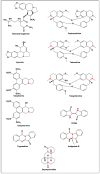Alkaloids: Therapeutic Potential against Human Coronaviruses
- PMID: 33255253
- PMCID: PMC7727683
- DOI: 10.3390/molecules25235496
Alkaloids: Therapeutic Potential against Human Coronaviruses
Abstract
Alkaloids are a class of natural products known to have wide pharmacological activity and have great potential for the development of new drugs to treat a wide array of pathologies. Some alkaloids have antiviral activity and/or have been used as prototypes in the development of synthetic antiviral drugs. In this study, eleven anti-coronavirus alkaloids were identified from the scientific literature and their potential therapeutic value against severe acute respiratory syndrome coronavirus-2 (SARS-CoV-2) is discussed. In this study, in silico studies showed an affinity of the alkaloids for binding to the receptor-binding domain of the SARS-CoV-2 spike protein, putatively preventing it from binding to the host cell. Lastly, several mechanisms for the known anti-coronavirus activity of alkaloids were discussed, showing that the alkaloids are interesting compounds with potential use as bioactive agents against SARS-CoV-2.
Keywords: COVID-19; MERS-CoV; SARS-CoV; SARS-CoV-2; antiviral drug; coronaviruses; natural products; virus.
Conflict of interest statement
No potential conflict of interest was reported by the authors.
Figures
References
-
- Choy K.-T., Wong A.Y.-L., Kaewpreedee P., Sia S.-F., Chen D., Hui K.P.Y., Chu D.K.W., Chan M.C.W., Cheung P.P.-H., Huang X. Remdesivir, lopinavir, emetine, and homoharringtonine inhibit SARS-CoV-2 replication in vitro. Antivir. Res. 2020:104786. doi: 10.1016/j.antiviral.2020.104786. - DOI - PMC - PubMed
-
- Aniszewski T. Alkaloids: Chemistry, Biology, Ecology, and Applications. Elsevier; Amsterdam, The Netherlands: 2015.
MeSH terms
Substances
LinkOut - more resources
Full Text Sources
Other Literature Sources
Miscellaneous



